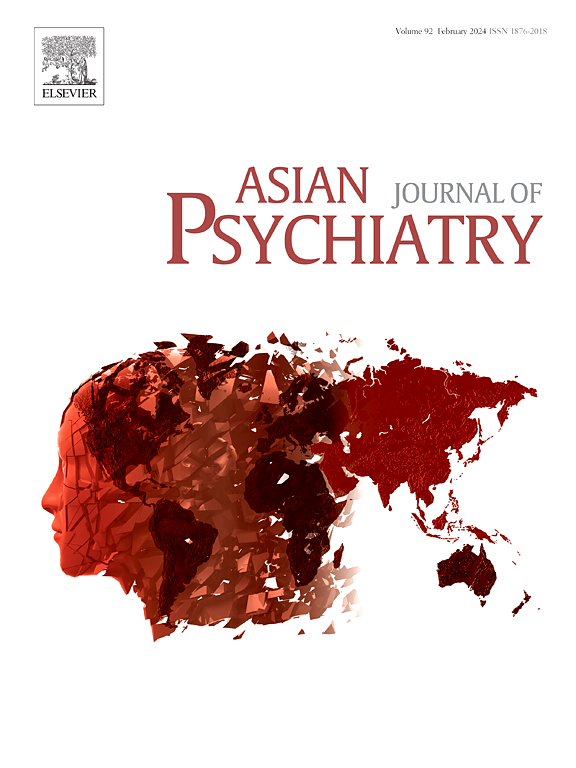土耳其大量精神病患者样本中导致治疗不依从性的因素
IF 3.8
4区 医学
Q1 PSYCHIATRY
引用次数: 0
摘要
目的探讨精神科患者治疗不依从性的影响因素。方法本研究是一项横断面研究,纳入了土耳其伊斯坦布尔住院的25 - 70岁精神障碍患者,共接触了1648例患者,其中1310例(79.5 %)同意参与。收集了一组社会人口学和临床变量,并执行了土耳其版的9项医患关系问卷(PDRQ-9)。统计分析包括t检验、卡方检验、因子分析、验证性因子分析以及洛伦兹曲线和基尼指数的计算。结果1310例患者中,治疗依从性761例(58.1% %),不依从性549例(41.9 %)。年龄大于60岁的患者在依从组中明显较少(p = 0.008)。非依从性患者更倾向于肥胖(p = 0.046),吸烟者(p = 0.019),nargilah -水烟使用者(p = 0.037),体育锻炼较少(p = 0.044)。病人诊断为精神分裂症(p = 0.034),双相情感障碍(p = 0.016),抑郁(p = 0.008),强迫症(p = 0.015)和痴呆/阿尔茨海默氏症(p = 0.003)更容易符合治疗而病人受到压力或创伤后应激障碍大大减少投诉(p = 0.015和0.006 p = ,分别)。违规行为的主要因素包括缺乏社会监督和家庭支持(p & lt; 0.001),不定期参加心理健康服务(p = 0.016),缺乏洞察力对治疗(p = 0.0124),缺乏满意的医生(p = 0.021),缺乏教育关于药物副作用(p & lt; 0.001),穷人和改善治疗(p = 0.005)。同时,探索性和验证性因素分析证实了土耳其版9项医患关系问卷(PDRQ-9)的效度和心理测量特征。结论精神科患者不遵医嘱发生率较高。同理心的医患方法、共同决策以及社会支持和心理教育干预对改善患者对治疗的态度及其依从性可能有用。本文章由计算机程序翻译,如有差异,请以英文原文为准。
Factors contributing to treatment non-compliance in a large sample of psychiatric patients in Turkey
Objective
This study aims to investigate the determinants of treatment non-compliance among psychiatric patients by exploring related factors.
Methods
This is a cross-sectional study including patients hospitalized for psychiatric disorders and aged between 25 and 70 years in Istanbul, Turkey. 1648 patients were approached and 1310 (79.5 %) agreed to participate. A set of sociodemographic and clinical variables were collected as well as the Turkish Version of the 9-item Patient-Doctor Relationship Questionnaire (PDRQ-9) was administered. Statistical analyses included t-tests, chi-square tests, factor analysis, Confirmatory Factor Analysis, and computation of the Lorenz curve and Gini index.
Results
Of 1310 patients, 761 (58.1 %) were compliant with treatments while 549 (41.9 %) were considered as non-compliant. Patients aged above 60 years were significantly less represented in the compliant group of patients (p = 0.008). Non-compliant patients were more like to be obese (p = 0.046), cigarette smokers (p = 0.019), nargileh-hookah users (p = 0.037), and perform less physical exercise (p = 0.044). Patients diagnosed with schizophrenia (p = 0.034), bipolar disorder (p = 0.016), depression (p = 0.008), obsessive-compulsive disorder (p = 0.015) and dementia/Alzheimer’s disease (p = 0.003) were more likely to be compliant with treatments whereas patients affected by stress or post-traumatic stress disorder were significantly less complaint (p = 0.015 and p = 0.006, respectively). The main factors contributing to non-compliance included lack of social supervision and family support (p < 0.001), not regular attendance of the mental health services (p = 0.016), lack of insight towards treatments (p = 0.0124), lack of satisfaction with the doctor (p = 0.021), lack of education regarding medications side effects (p < 0.001), and poor perceived improvement with treatment (p = 0.005). Concurrently, the exploratory and confirmatory factor analyses confirmed validity and psychometric characteristics of the Turkish version of the 9-item Patient-Doctor Relationship Questionnaire (PDRQ-9).
Conclusion
This study reported a high prevalence rate of non-compliance among psychiatric patients. An empathetic patient-doctor approach, shared decision making as well as socially supportive and psychoeducational interventions are potentially useful for improving patients’ attitudes toward treatments and their compliance.
求助全文
通过发布文献求助,成功后即可免费获取论文全文。
去求助
来源期刊

Asian journal of psychiatry
Medicine-Psychiatry and Mental Health
CiteScore
12.70
自引率
5.30%
发文量
297
审稿时长
35 days
期刊介绍:
The Asian Journal of Psychiatry serves as a comprehensive resource for psychiatrists, mental health clinicians, neurologists, physicians, mental health students, and policymakers. Its goal is to facilitate the exchange of research findings and clinical practices between Asia and the global community. The journal focuses on psychiatric research relevant to Asia, covering preclinical, clinical, service system, and policy development topics. It also highlights the socio-cultural diversity of the region in relation to mental health.
 求助内容:
求助内容: 应助结果提醒方式:
应助结果提醒方式:


